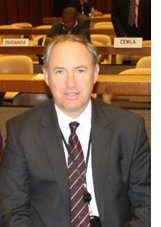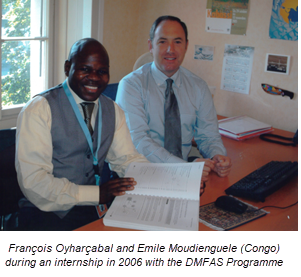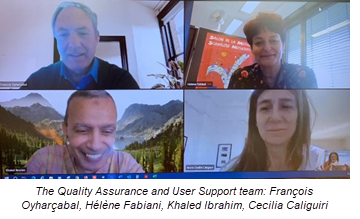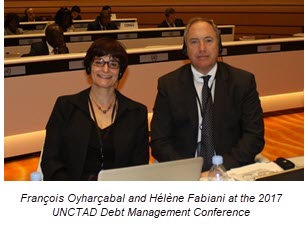Version française - Versión española
 François Oyharçabal, technical writer in the DMFAS Programme since 2003, retired at the end of June. His role is perhaps less known to the DMFAS community, but nonetheless essential.
François Oyharçabal, technical writer in the DMFAS Programme since 2003, retired at the end of June. His role is perhaps less known to the DMFAS community, but nonetheless essential.
What is your role in the DMFAS Programme? And how has it evolved over the years?
I am a technical writer in the DMFAS Programme. It is an atypical profession within the United Nations and less visible to DMFAS users requiring a hybrid profile, curiosity and will to learn and, of course, love writing. It's an interesting job that requires listening to users to understand their needs and develop adapted and useful material. There is a tendency to forget the amount of work that goes into developing user documentation and training materials. In addition to the writing of the documentation, all manuals and materials produced must be validated and technical information must be transformed into understandable language.
The writer is a bridge between users and technicians. There is a great deal of work to be done in terms of adapting information, as it must be understood and used by non-specialists.
How has this role evolved over the years?

I first joined the Programme in 2003 for an 18 months project for the development of user documentation for version 5.3. Then the scope of the work expanded to include technical documentation and training modules. For example, with my colleague Hélène Fabiani, we developed new learning products such as the fact sheets on debt, tutorials and self-learning modules to complement the user documentation.
With the evolution of the profession, visual communication (graphics, images) and web technology have become very important. The era of large manuals with lengthy texts is over. Today we have to communicate differently. With the "home computer" revolution and the democratization of personal computers, the nature of the work changed.
What are your best experiences or memories with the Programme?
 During my career with DMFAS, I have been able to work with a great deal of autonomy in an environment that respects our contribution. The Programme team has a unique identity within UNCTAD.
During my career with DMFAS, I have been able to work with a great deal of autonomy in an environment that respects our contribution. The Programme team has a unique identity within UNCTAD.
There is a lot to do: writing documentation, localization (translation), testing of materials, etc. With Hélène, we innovated on the documentation and our proposals were quickly recognized and appreciated, especially for the quality of the documents produced, which is a great satisfaction for us.

With version 6, everything had to be invented in the field of documentation with the complete change of technology of the system. It was a very exciting time.
The UNCTAD debt management conferences, that are held every two years, have also always been very enriching and an opportunity to meet users.
On a day-to-day basis, it has been a great pleasure to work at the Palais, with colleagues from all over the world and with a lot of friendly colleagues within the Programme.
Now that you are retiring, what are your plans?
After my retirement I will stay in Geneva for a couple of months and then move to the Basque Country in France. I will continue to play music, hike and travel.
François, the whole team wishes you a happy retirement!
